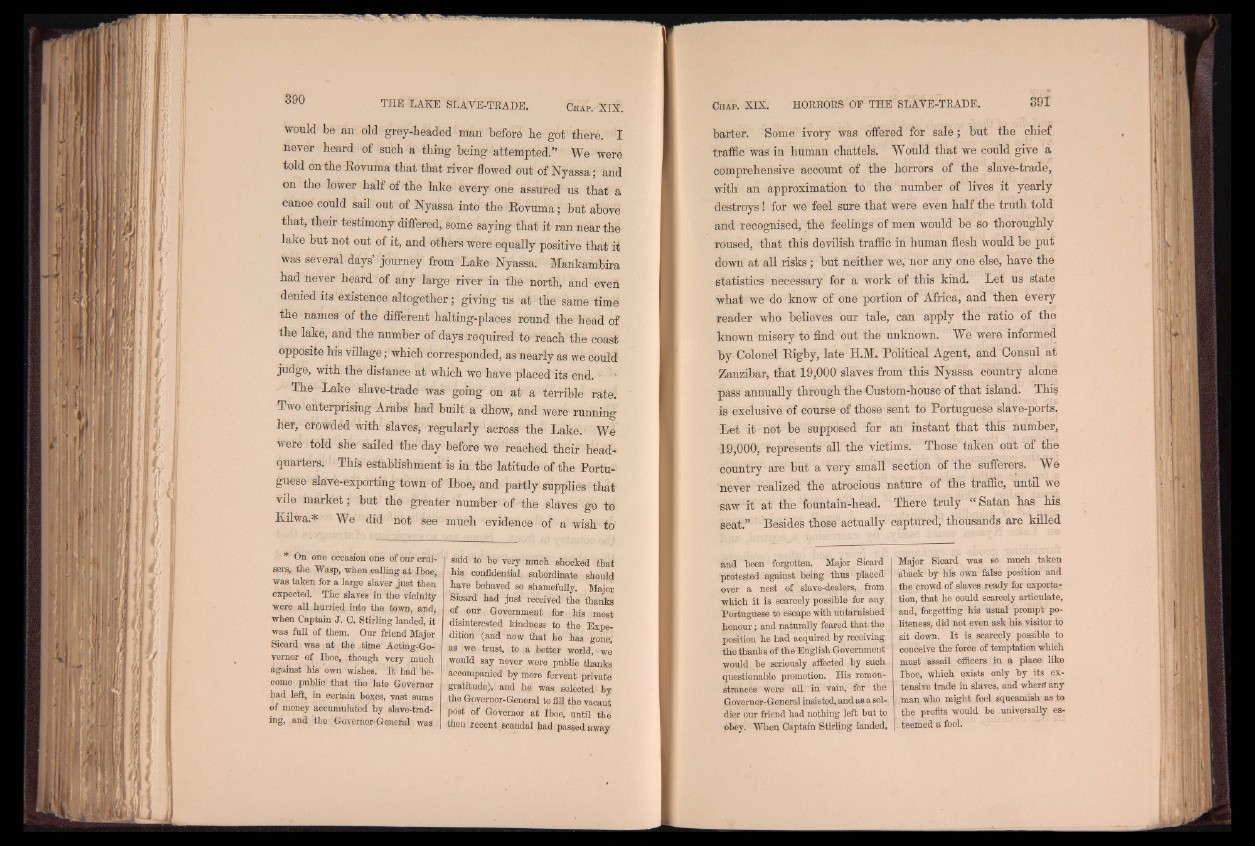
would be an old grey-headed man before he got there. I
never heard of such a thing being attempted.” We were
told on the Eovuma that that river flowed out of Nyassa; and
on the lower half of the lake every one assured us that a
canoe could sail out of Nyassa into the Eovuma; but above
that, their testimony differed, some saying that it ran near the
lake but not out of it, and others were equally positive that it
Was several days’ journey from Lake-Nyassa. Mankambira
had never heard of any large river in the north, and evefl
denied its existence altogether; giving us at the same time
the names of the different halting-places round the head of
the lake, and the number of days required to reach the coast
opposite his village; which corresponded, as nearly as we could
judge, with the distance at which we have placed its end. > '•
The Lake slave-trade was going on at a terrible rate.
Two enterprising Arabs had built a dhow, and were running
her, crowded with slaves, regularly across the Lake. We
were told she sailed the day before we reached their head*
quarters. This establishment , is in the latitude of the Portuguese
slave-exporting town of Iboe, and partly supplies that
vile market; but the greater number of the slaves go to
Kilwa.* We did not see much evidence of a wish to
* On one occasion one of our cruisers,
the Wasp, when calling at Iboe,
was taken for a large slaver just then
expected. The slaves in the vicinity
were all hurried into the town, and,
when Captain J. 0. Stirling landed, it
was full of them. Our friend Major
Sicard was at the time Acting-Go-
vemor of Iboe, though very much
against his own wishes. It had become
public that the late Governor
had left, in certain boxes, vast sums
of money accumulated by slave-trading,
and the Governor-General was
said to be very much shocked that
his confidential subordinate should
have behaved so shamefully. Major
Sicard had just received the thanks
of our Government for his most
disinterested kindness to the Expedition
(and now that he has gone,
as we trust, to a better world, - we
would say never were public thanks
accompanied by more fervent private
gratitude), and he was selected by
the Governor-General to fill the vacant
post of Governor at Iboe, until the
then recent scandal had passed away
barter. Some ivory was offered for sale; but the chief
traffic was in human chattels. Would that we could give á
comprehensive account of the horrors of the slave-trade,
with an approximation to the number of lives it yearly
destroys! for we feel sure that were even half the truth told
and recognised, the feelings of men would be so thoroughly
roused, that this devilish traffic in human flesh would be put
down at all risks ; but neither we, nor any one else, have the
statistics necessary for a work of this kind. Let us state
what we do know of one portion of Africa, and then every
reader who believes our tale, can apply the ratio of the
known misery to find out the unknown. We were informed
by Colonel Eigby, late H.M. Political Agent, and Consul at
Zanzibar, that 19,000 slaves from this Nyassa country aloné
pass annually through the Custom-house of that island. Thi§
is exclusive of course of those sent to Portuguese slave-portsi
Let it - not be supposed for an instant that this number,
19,000, represents all the victims. Those taken out of the
country are but a very small section of the sufferers. We
never realized the atrocious nature of the traffic, until we
saw it at the fountain-head. There truly “ Satan has his
seat.” Besides those actually captured, thousands are killed
and been forgotten. Major Sicard
protested against being thus placed
over a nest of slave-dealers, from
which it is scarcely possible for any
Portuguese to escape with untarnished
honour; and naturally feared that the
position he had acquired by receiving
the thanks of the English Government
would be seriously affected by such
questionable promotion. His remonstrances
were all in vain, for the
Governor-General insisted, and as a soldier
our friend had nothing left but to
Major Sicard was so much taken
aback by his own false position and
the crowd of slaves ready for exportation,
that he could scarcely articulate,
and, forgetting his usual prompt politeness,
did not even ask his visitor to
sit down. I t is scarcely possible to
conceive the force of temptation which
must assail officers in a place like
Iboe, which exists only by its extensive
trade in slaves, and where any
man who might feel squeamish as to
the profits would be universally es